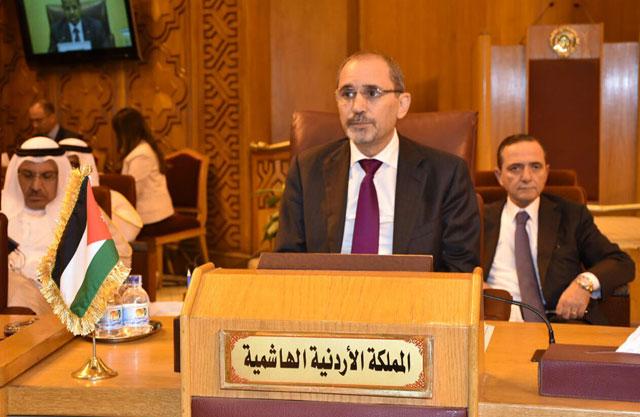You are here
Safadi urges concerted efforts, holistic approach in post-Daesh region
By JT - Jan 24,2019 - Last updated at Jan 24,2019
AMMAN — Foreign Minister Ayman Safadi on Thursday said that terrorism is a common threat that requires a “collective effort and holistic approach” to build on the military victories achieved in the anti-terror fight.
“That is why in Jordan, His Majesty [King Abdullah] has launched the Aqaba process, which is basically a platform to bring people together for coordinating efforts to ensure that we work collectively” to overcome the threat, he told participants of a panel discussion held as part of Davos 2019's session on the Middle East security outlooks, stressing that the term “holistic” is key in this context, because the threat would return to a country where it was eliminated if it remains in another.
As part of the Jordanian delegation to the 49th World Economic Forum in Davos, Switzerland, Safadi urged intensified cooperation among stakeholders to eradicate the security threat of terror and called for ending regional conditions of deprivation and suppression, through which terrorists penetrate societies, in addition to addressing the “ideology of hate” embraced by terrorists, “which needs a very strong narrative”.
The Palestinian conflict remains the core conflict in the Middle East, he added, and although it remains a political conflict, terror groups like Daesh can use the despair ensuing from it for recruitment purposes.
He said that Jordan still believes that the two-state solution to the Mideast problem, although it is becoming more and more difficult to achieve, is the only viable solution to the conflict, asking: “What is the alternative: the one-state solution?”
On Iraq, he said that the country’s triumph over Daesh is a victory for the entire region, urging cooperation and support for Iraqis to sustain that victory to rebuild the country, and calling for the same in Syria, which has seen a great deal of destruction over eight years of conflict.
“The objective is saving Syria through a political solution and... national reconciliation.”
Along with Safadi, speakers on the panel included Mohamed Ali Alhakim, Iraq’s minister of foreign affairs, Rached Ghannouchi, leader of Tunisia’s Ennahda Party, and Majid Jafar, CEO of Crescent Petroleum.
On the sidelines of his participation in the forum, Safadi met with several high-profile delegates, including his Iraqi peer, with whom he discussed cooperation in the Iraq Rebuild scheme and anti-terror, among other issues.
He also discussed bilateral ties and regional developments with Saudi Foreign Minister Ibrahim Assaf and met with his Polish counterpart Jacek Czaputowicz over economic ties and ways to push the Mideast peace process forward.
Safadi also met with United Nations High Commissioner for Refugees Filippo Grandi and discussed with him Jordan’s efforts pertaining to hosting refugees and cooperation between the Kingdom and the UNHCR and other international agencies to meet the needs of the Kingdom’s guests.
Related Articles
AMMAN — Foreign Minister Ayman Safadi on Sunday stressed the importance of joint Arab action to safeguard Arab national, economic, political
AMMAN — Following is the full transcript of His Majesty King Abdullah’s conversation with CNN’s Fareed Zakaria on Thursday, January 25, 2018
AMMAN — His Majesty King Abdullah on Monday received US National Security Council Coordinator for the Middle East and North Africa Brett McG

















